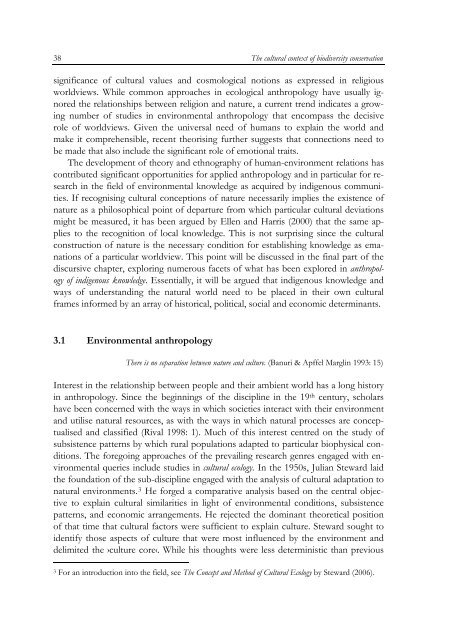The cultural context of biodiversity conservation - Oapen
The cultural context of biodiversity conservation - Oapen
The cultural context of biodiversity conservation - Oapen
You also want an ePaper? Increase the reach of your titles
YUMPU automatically turns print PDFs into web optimized ePapers that Google loves.
38<br />
<strong>The</strong> <strong>cultural</strong> <strong>context</strong> <strong>of</strong> <strong>biodiversity</strong> <strong>conservation</strong><br />
significance <strong>of</strong> <strong>cultural</strong> values and cosmological notions as expressed in religious<br />
worldviews. While common approaches in ecological anthropology have usually ignored<br />
the relationships between religion and nature, a current trend indicates a growing<br />
number <strong>of</strong> studies in environmental anthropology that encompass the decisive<br />
role <strong>of</strong> worldviews. Given the universal need <strong>of</strong> humans to explain the world and<br />
make it comprehensible, recent theorising further suggests that connections need to<br />
be made that also include the significant role <strong>of</strong> emotional traits.<br />
<strong>The</strong> development <strong>of</strong> theory and ethnography <strong>of</strong> human-environment relations has<br />
contributed significant opportunities for applied anthropology and in particular for research<br />
in the field <strong>of</strong> environmental knowledge as acquired by indigenous communities.<br />
If recognising <strong>cultural</strong> conceptions <strong>of</strong> nature necessarily implies the existence <strong>of</strong><br />
nature as a philosophical point <strong>of</strong> departure from which particular <strong>cultural</strong> deviations<br />
might be measured, it has been argued by Ellen and Harris (2000) that the same applies<br />
to the recognition <strong>of</strong> local knowledge. This is not surprising since the <strong>cultural</strong><br />
construction <strong>of</strong> nature is the necessary condition for establishing knowledge as emanations<br />
<strong>of</strong> a particular worldview. This point will be discussed in the final part <strong>of</strong> the<br />
discursive chapter, exploring numerous facets <strong>of</strong> what has been explored in anthropology<br />
<strong>of</strong> indigenous knowledge. Essentially, it will be argued that indigenous knowledge and<br />
ways <strong>of</strong> understanding the natural world need to be placed in their own <strong>cultural</strong><br />
frames informed by an array <strong>of</strong> historical, political, social and economic determinants.<br />
3.1 Environmental anthropology<br />
<strong>The</strong>re is no separation between nature and culture. (Banuri & Apffel Marglin 1993: 15)<br />
Interest in the relationship between people and their ambient world has a long history<br />
in anthropology. Since the beginnings <strong>of</strong> the discipline in the 19 th century, scholars<br />
have been concerned with the ways in which societies interact with their environment<br />
and utilise natural resources, as with the ways in which natural processes are conceptualised<br />
and classified (Rival 1998: 1). Much <strong>of</strong> this interest centred on the study <strong>of</strong><br />
subsistence patterns by which rural populations adapted to particular biophysical conditions.<br />
<strong>The</strong> foregoing approaches <strong>of</strong> the prevailing research genres engaged with environmental<br />
queries include studies in <strong>cultural</strong> ecology. In the 1950s, Julian Steward laid<br />
the foundation <strong>of</strong> the sub-discipline engaged with the analysis <strong>of</strong> <strong>cultural</strong> adaptation to<br />
natural environments. 3 He forged a comparative analysis based on the central objective<br />
to explain <strong>cultural</strong> similarities in light <strong>of</strong> environmental conditions, subsistence<br />
patterns, and economic arrangements. He rejected the dominant theoretical position<br />
<strong>of</strong> that time that <strong>cultural</strong> factors were sufficient to explain culture. Steward sought to<br />
identify those aspects <strong>of</strong> culture that were most influenced by the environment and<br />
delimited the ›culture core‹. While his thoughts were less deterministic than previous<br />
3 For an introduction into the field, see <strong>The</strong> Concept and Method <strong>of</strong> Cultural Ecology by Steward (2006).

















